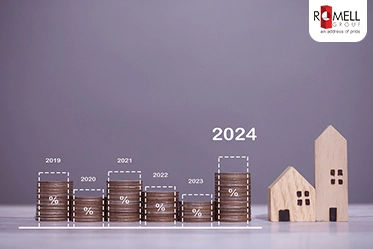The Real Estate Future and Budget 2024: Emerging Trends and Predictions
As we step into 2024, the real estate landscape is anticipated to create a significant impact for both individuals and businesses involved in the industry. The real estate industry stands as a threshold of the evolving era. From commercial to residential properties, the Indian real estate market has displayed remarkable growth, charting a trajectory of recovery after the Covid-19 pandemic.
Many banks and financial institutions reduced the interest rates on home loans, making it easy for people to avail of homes at economical rates, especially for residential projects in Mumbai. Also, it provides them with better investment options as capital appreciates over the time period. At the same time, many government policies, like RERA, helped create smooth functioning in the real estate market. It’s a win-win!
The Budget 2024 takes on paramount importance as it will serve as the linchpin for sustaining this momentum and navigating the sector through persistent challenges. Independent studies indicate unparalleled residential sales of 4.77 lakh units across the top seven cities in India.
Here, we explore some emerging trends and predictions shaping the future of real estate and how budget considerations may influence decision-making in 2024.
Prediction of the Real Estate Market in 2024
The recent Interim Budget 2024 has illuminated a transformative path, particularly emphasizing on infrastructure development and connectivity.
Based on a close examination of the budgetary allocations, it appears that the government is making a strategic move, with an 11.1% increase in the outlay for capital expenditure, which accounts to a staggering INR 11.11 lakh crore, or more than 3.4% of the GDP. Also, residential properties in Mumbai witnessed registration of 10,901 properties in January 2024.
Following are some predicted trends that might shape the future of the real estate sector in India in 2024.
- Resilience and Adaptability
In the wake of global disruptions such as the COVID-19 pandemic, resilience and adaptability have become central themes in real estate planning and development. In 2024, we expect a continued emphasis on flexible spaces that accommodate remote work, hybrid lifestyles, and changing consumer behaviours. Commercial properties may undergo adaptive reuse, repurposing underutilized spaces to meet evolving demands for coworking hubs, community centres, and last-mile logistics facilities.
- Sustainable and Eco-Friendly Practices
Environmental sustainability is no longer a mere buzzword but a critical consideration in real estate development and investment. In 2024, we anticipate a growing focus on eco-friendly building designs, energy-efficient technologies, and green certifications such as LEED and BREEAM. Sustainable features, such as solar panels, green roofs, and rainwater harvesting systems, will not only reduce operational costs but also enhance property value and appeal to environmentally conscious tenants and investors.
- Urban Revitalization and Suburban Migration
The urban-suburban dynamic is undergoing a reevaluation as remote work and lifestyle preferences drive population shifts. While urban centres remain hubs of economic activity and cultural amenities, suburban and exurban areas are witnessing renewed interest fueled by affordability, space, and quality of life considerations. In 2024, we may see continued investment in suburban infrastructure, amenities, and mixed-use developments. There are many new projects in Andheri West, Mumbai, which cater to a diverse range of housing needs and preferences.
- Technology Integration and PropTech Innovations
Technology continues to revolutionize the real estate industry, enabling smarter, more efficient, and connected spaces. In 2024, we anticipate accelerated adoption of PropTech solutions, including artificial intelligence, IoT sensors, virtual reality, and blockchain, to streamline property management, enhance tenant experiences, and optimize building performance. Investment in digital infrastructure and cybersecurity measures will be paramount to safeguarding data and ensuring the reliability of tech-driven systems.
- Budget Considerations and Fiscal Policies
Against the backdrop of these emerging trends, budget considerations and fiscal policies will play a pivotal role in shaping real estate decisions in 2024. Government incentives, tax reforms, and regulatory changes may incentivize investment in affordable housing, sustainable development, and infrastructure projects aimed at bolstering economic recovery and resilience. Additionally, rising construction costs, materials shortages, and inflationary pressures may necessitate prudent budgeting and risk management strategies for developers and investors alike
To Conclude:
As we navigate the real estate future in 2024, embracing innovation, sustainability, and resilience will be key to staying competitive and future-proofing investments.
By understanding and adapting to emerging trends, harnessing technological advancements, and aligning with budget considerations and fiscal policies, industry stakeholders can seize opportunities and navigate challenges confidently, shaping a dynamic and vibrant real estate landscape for years to come.








